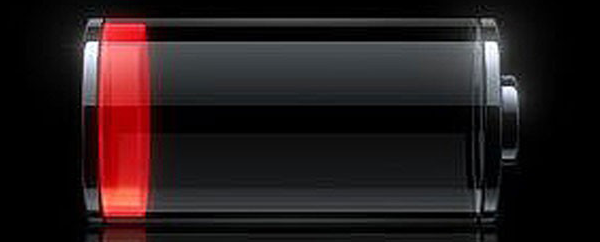Of course iPhone 4S battery life matters

Last night, my colleague Ed Oswald made the most ridiculous statement in defense of iPhone 4S: "Battery life is not a showstopping defect", and he put it in italics! I disagree and told him so in group chat: "It's a real apologist post. Battery life is a showstopping defect". Ed's commentary responds to so called "Batterygate", where for many iPhone 4Ses the charge drains too fast. On Thursday, Apple released an update that fixes the problem for some, but not for many others. Meanwhile, the company issued a statement that: "We continue to investigate a few remaining issues".
Absolutely, smartphone battery life matters, and, yes, it's a "showstopping defect". In a survey of 23,000 phone and tablet users, conducted by SwiftKey developer and retailer/accessory maker Smartphone Experts, battery life ranked third as "essential" feature when answering "What's important when buying a new smartphone". When adding "quite important", battery life tops the list, which includes screen size, ease of typing and app availability.
Battery life is important enough that Apple fairly quickly released an iOS 5 update to fix a problem previously stated as affecting a small number of users, and afterwards acknowledging there are "remaining issues".
According to a survey conducted by ad network inMobi, days before Apple announced iPhone 4S, "consumers are most hopeful for improved battery life; increased processing speed; higher-quality screen resolution; and stronger phone service in the rumored Apple smartphone". Clearly battery life matters to somebody looking to buy iPhone 4S, or owning one already.
Smartphone charging habits also reveal something about battery life. Study "Understanding Human-Smartphone Concerns: A Study of Battery Life" by Denzil Ferreira, Anind Dey and Vassilis Kostakos is an excellent primer on consumer habits. The researchers measured battery usage and charging on more than 17,000 smartphones -- 4,035 opted in to the study. "Users mostly avoided lower battery levels, with the daily average of the lowest battery percentage values being 30 percent". Battery life mattered enough that many participants didn't wait for zero or even close to it. However, the researchers attributed some of this behavior to notification: "The Android devices’ battery icon turns yellow at 30 percent".
'Them, Too' is No Excuse
Ed excuses iPhone 4S battery problems using the 'them, too' argument: "iPhone 4S is nothing different from any smartphone, and if you're going to return it, then you should return them all. It's an issue the industry needs to address overall, and without a breakthrough will only get worse as Newman says". Ed refers to Jared Newman's PC World post claiming smartphone battery life problems are industrywide.
In group chat last night I chided Ed:
It's absolutely insane to excuse Apple by saying that iPhone 4S is no worse than other smartphones, because:
- Apple aspires to be better
- Many buyers expect Apple products to be better
- Poor battery life is a showstopping defect
That's a major reason it comes across as Apple apology, excuses like this.
There's mystique around Apple being more innovative than everyone else. Oh yeah? So why excuse Apple for being the same as everyone else.
The measure of sameness isn't what either my colleague or Newman states. Smartphone battery life is hugely improved today compared to 18 months ago. I can only personally speak about Apple and Samsung. I've used two different iPhone 4 models, purchased about eight months apart. Battery life was exceptional for both. I typically recharged every other day and about every 24 hours with heavy use (or what it is for me). The Samsung-manufactured, Google-branded Nexus offered about 80 percent the performance and the same or better than iPhone 4 when keeping off Bluetooth and turning on WiFi.
My smartphone battery-saving tip: Only use Bluetooth when you must -- where hands-free usage is absolutely necessary -- because it's a battery-life sucker. Turning on WiFi can actually improve battery life, as counter-intuitive as that may seem. Cellular connection is flaky in my area. By turning on WiFi, the smartphone consumes considerably less juice trying to maintain data connection to the 3G network for routine tasks, more than offsetting what WiFi consumes.
Back to actual battery life, I recently owned Samsung Galaxy S II and last week replaced it with Galaxy S II Skyrocket. Standard S II battery life was better than iPhone 4 and Skyrocket is about the same. Caveat: There's no LTE in my area, so I can't measure its impact on battery life.
It's Not Bad Press
Ed also excuses Apple by blaming the news media:
The tech press shares some responsibility here in reporting this story accurately. While there is a battery life issue, there is nothing but anecdotal evidence to understand its extent. Like Antennagate before Batterygate -- which required phones to be held in a certain manner that most do not -- we have a tendency to overdo it.
Considering how overly positive blog posts or news stories about Apple tend to be, that's quite the assertion to make. Here's a thought: What if there's so much online about iPhone 4S battery life because the function really does matter to people -- and, gasp, it is a "showstopping defect" for many?
Last week, I asked: "Why can't Apple get iPhone's design right?" That Ed calls the battery life problem a "defect" at all deflates much of the Apple apology. It's acknowledgment of a real problem.
Betanews commenter Michael C expresses the situation of many: "So far the update has been pretty much useless on my 4s. I am turning off features to save battery life, which were kind of the point in purchasing a 4s to begin with. Sooooo, less features to save power means my phone is not the phone I thought I was getting".
That doesn't matter?